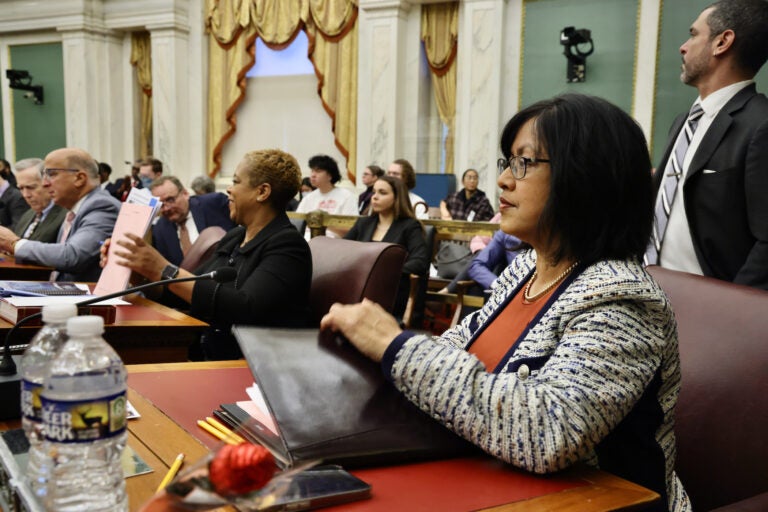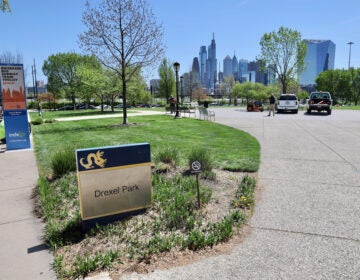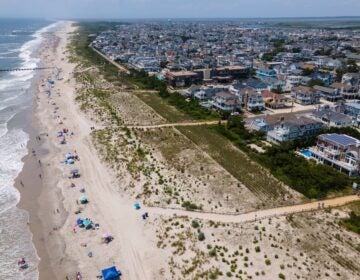Philadelphia City Council urges Parks and Rec to stop using chemical herbicides
Councilmember Nina Ahmad said Parks and Recreation officials are ignoring the 2020 law. The city department says the natural herbicides don’t work.
Listen 0:51
Philadelphia City Councilmember Nina Ahmad. (Emma Lee/WHYY)
This story is part of the WHYY News Climate Desk, bringing you news and solutions for our changing region.
From the Poconos to the Jersey Shore to the mouth of the Delaware Bay, what do you want to know about climate change? What would you like us to cover? Get in touch.
Philadelphia City Council had terse words for Parks and Recreation officials for refusing to follow a 2020 law that bans the use of chemical herbicides in public spaces.
Councilmember Dr. Nina Ahmad called the chemicals “poison” and said there was no reason to use them, especially with a law in place forbidding their use on city green spaces. Ahmad questioned why the Parks and Recreation department is ignoring the law.
“I do not understand why we are having to rehash this all over again because it is abundantly clear this is poison,” Ahmad said Tuesday at a City Council hearing on the issue. “No other way to put it, it is poison. We don’t need it.”
The law, referred to as HOPS (“Healthy Outdoor Public Spaces”), forbids chemical use in all city-owned playgrounds, parks, trails and recreation centers. The law also requires the city’s Department of Parks and Recreation to document the usage of any pesticide and report back annually to City Council.
Parks and Recreation Commissioner Sue Slawson said the department has tried to use natural herbicides and even goats to tackle weeds, but that so far nothing has been successful.
“Our application of synthetic herbicides is based on guidance from an extensive network of natural and local subject matter experts, such as environmental scientists and well-respected practitioners,” Slawson said at the hearing led by the Committee on Labor and Civil Services, as well as the Committee on Parks, Recreation and Cultural Affairs.
Dr. Linda Stern of the group Toxic Free Philly testified as a medical professional who spent the majority of her career treating veterans exposed to the toxic herbicide Agent Orange. Stern said the Parks and Rec department sprays one of the two active ingredients of the defoliant on playgrounds on a regular basis.
She added that glyphosate, the most widely used pesticide on the planet, is sprayed “by the ton in Philadelphia.”
Scientific evidence, she said, shows that exposure to the chemical is dangerous to humans, especially pregnant women, young children and the workers who apply them. The World Health Organization says glyphosate is a “probable human carcinogen.” But the U.S. Environmental Protection Agency says exposure to glyphosate does not pose a risk to human health, if used correctly, a decision that has been challenged in courts.
Councilmember Jim Harrity, who worked as a city highway worker before becoming a council member, was pleased that at least workers spraying toxic chemicals are given proper protective clothing, respirators and gloves. But he questioned why the chemicals are being used in the first place, and wondered if they were given enough time to dry before children had access to the properties being treated.
Former Mayor Jim Kenney refused to sign the bill back in 2020, and requested City Council work out a compromise, which never happened, so the law took effect without his signature.
Slawson said Parks and Rec continues to partner with groups to find a natural solution to its issues, but have yet to do so. Even using goats to defoliate areas failed to completely remove weeds, Slawson said, leading to regrowth.
Nasir Johnson, 19, is a cancer survivor who said he thinks his leukemia came from playing basketball on a city court.
“I grew up playing basketball at Lonnie Young Center, when I was 14,” Johnson testified at the hearing. “I started to feel short of breath when I played basketball one morning. I woke up with a bruise on my face. It came out of nowhere. My mother was concerned and took me to a doctor, it turned out I had leukemia. “
Johnson was laid up at the Children’s Hospital of Philadelphia for over a year, undergoing 45 blood transfusions and nine operations.
“I’m glad to say I’ve been in remission for three years now, but I lost a year and a half of my life. We don’t know for sure, but if there’s any chance the herbicide sprayed on the courts to control weeds is causing my cancer, there is no good reason to keep using them,” he said.
No final plan of action has been worked out, although both sides did agree to review the issue again this fall.

Get daily updates from WHYY News!
WHYY is your source for fact-based, in-depth journalism and information. As a nonprofit organization, we rely on financial support from readers like you. Please give today.






